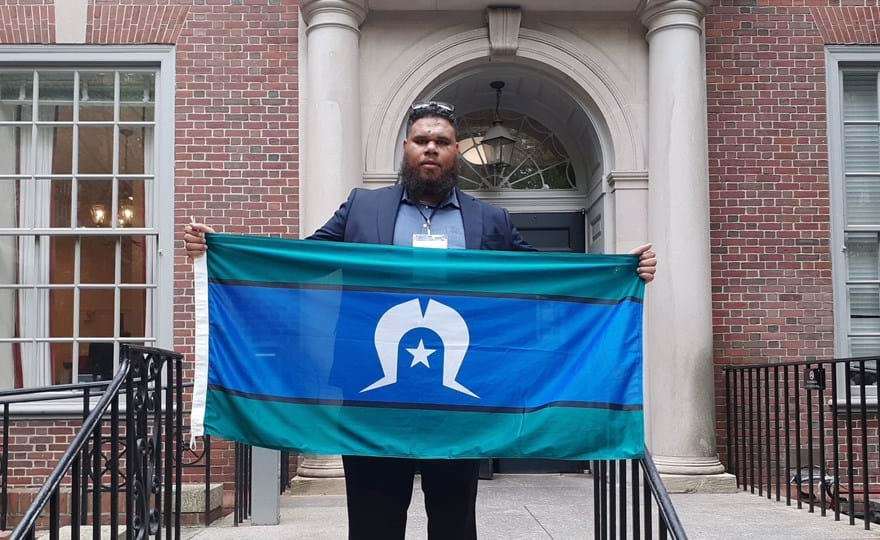
In May this year, eight islanders from four different islands in the Torres Strait lodged a world-first complaint to the UN Human Rights Committee, over the threat to their human rights. Today, they have formally requested Prime Minister Scott Morrison visit their low-lying islands and witness for himself climate impacts in the region.
A representative from the complainants, Kabay Tamu, personally delivered the invitation to Australia’s Ambassador and Permanent Representative to the UN, Her Excellency Gillian Bird, in New York.
Standing up for climate injustice
“Failing to act on climate change means failing to protect the human rights of the Torres Strait people, and is a breach of international human rights law.
Kabay was also in New York to speak at the world’s first global summit on human rights and climate change, ahead of the UN climate summit next week.
Speaking at the summit, Kabay said: “Our people have inhabited the Torres Strait Islands continuously for thousands of years. Our traditional way of life is facing an existential threat because of climate change.
“Australians all across the country are facing devastating impacts like bushfires, floods, rising seas, dying coral reefs and biodiversity extinctions. Yet the government’s response has been woeful.
“As fellow islanders, we were embarrassed by Australia’s showing at last month’s Pacific Islands Forum. Also disappointing was the Prime Minister’s decision to visit the US but skip next week’s UN climate summit.
“With no clear signal the Federal Government is acting with the urgency needed, we’re urging the PM to visit our islands, meet our communities and see the climate crisis for himself.”
Australia’s continued failure to act on climate change
In their invitation to the Prime Minister, the claimants pointed to a recent study showing that not only does Australia have one of the world’s highest carbon footprints per capita, but when fossil fuel exports were taken into account, Australia’s total greenhouse gas emissions amounts to approximately five percent of total global emissions – the equivalent of Russia’s total emissions. The study estimated that Australia’s emissions could then rise to 17% of the world’s total by 2030.
Our Australian climate lawyer Sophie Marjanac is an Australian climate lawyer working at ClientEarth. She is supporting the islanders with their complaint against the Australian government. She said: “Australia punches far above its weight when it comes to greenhouse emissions and it’s affecting those in the Pacific that have contributed least to the problem.”
In the Torres Strait, rising seas caused by climate change are threatening homes, swamping burial grounds and washing away sacred cultural sites. Amid the steady erosion of coastlines, islanders are witnessing communities being inundated, infrastructure damaged, sea walls and flood defences breached, fresh water wells contaminated and plants and crops spoiled.
Sophie explained: “Failing to act on climate change means failing to protect the human rights of the Torres Strait people, and is a breach of international human rights law.
“Australia’s continued failure to build sea walls to protect the region’s islands, its continued support for fossil fuels, and its obstruction of global efforts to reduce emissions, constitutes a clear violation of the islanders’ rights to culture, family and life.”